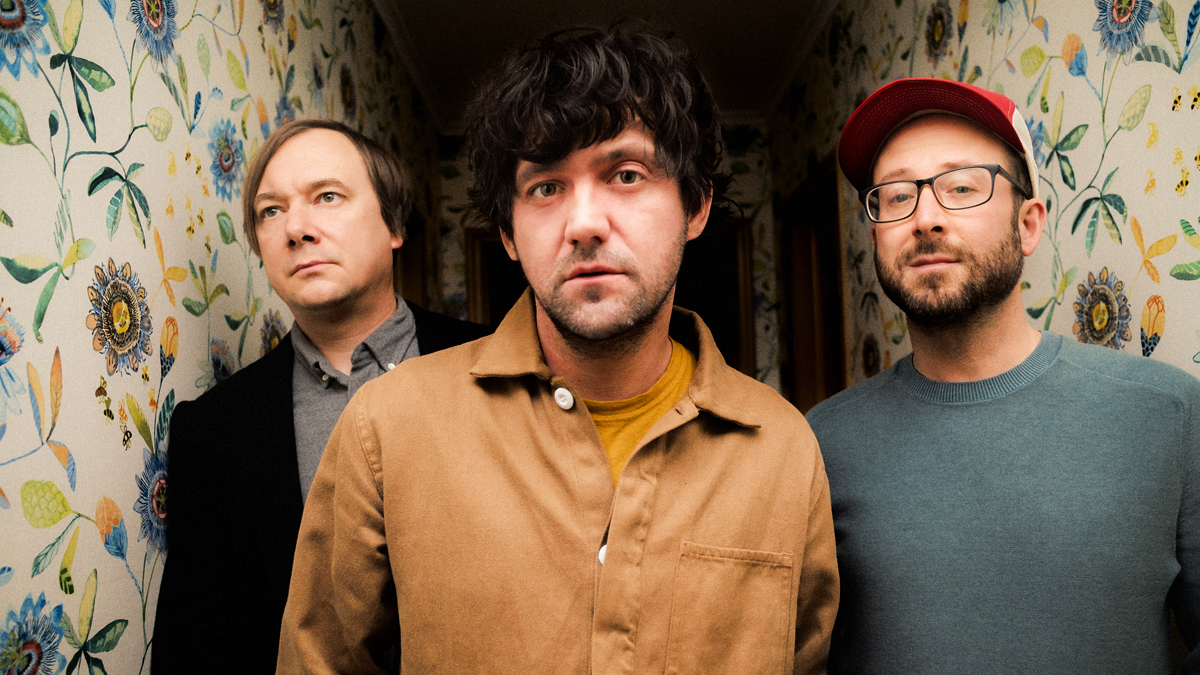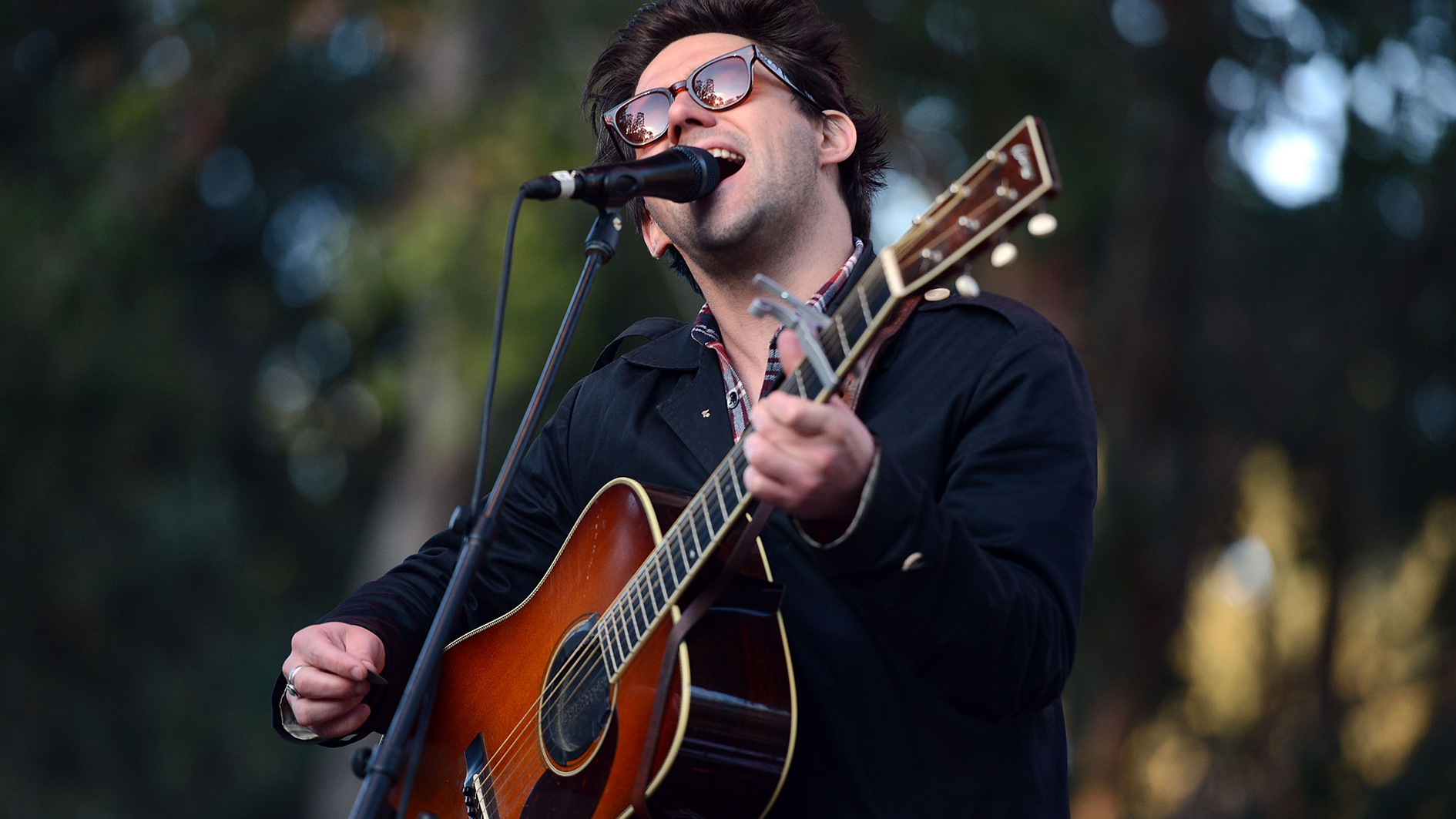Bright Eyes: "Getting guitar sounds is about how you employ gear, how you hear it and react, all of the little micro things"
We chat with Conor Oberst and Mike Mogis about the band's cathartic new album, and how it ended up featuring tapped guitar solos and the Mars Volta's rhythm section
![[L-R] Mike Mogis and Conor Oberst of Bright Eyes](https://cdn.mos.cms.futurecdn.net/ANN3jyAN6SYzYC8nnEarWe.jpg)
It takes Guitar World about two months to track down Bright Eyes. Conor Oberst and Mike Mogis still live close to each other in Omaha, Nebraska, but they keep themselves busy. When we check in, Mogis has been working on a soundtrack, which alongside producing, is how he’s filled most of his time since Bright Eyes’ last outing, 2011’s The People’s Key.
This project - an adaptation of Stephen King’s The Stand - features a rockstar character, Larry Underwood, and the director wants a tune that lands somewhere between Jimi Hendrix and Gary Clark Jr. A lifelong Hendrix fan, Mogis confesses he leaned into the opportunity.
"I played for about three hours," he tells Guitar World. "I hadn't stood up and played rock guitar in so long... A lot of emotion came out." As did some blisters and a neck ache. But you can’t blame any musician for feeling rusty, right now, let alone the one’s who have spent a decade off the road…
Oberst on the other hand, says he’s barely touched a guitar throughout the pandemic, yet his folksy footprint - and what he describes at one point as “orangutang style” fingerpicking - still clearly reverberates throughout the indie world.
In the early 2000s, Bright Eyes recasted the role of the folk-rock band, knocked the faux dust off its edges and delighted in messing with the formula, with samples, stomp boxes and a rotating cast of rhythm sections and guest spots.
Now their return in 2020, Down In The Weeds, Where The World Once Was, feels appropriately timed. It’s a harder, rockier, more spacious form of Bright Eyes, but still has that endearing sense of catharsis. It’s all given added bombast by the addition of an unusual choice of rhythm section, made up of none other than Flea and Queens Of The Stone Age drummer, Jon Theodore (the duo behind Mars Volta’s debut).
It’s their most rock-centric record for a while. We spent some time mulling the impact of Flea and Theodore, Fano guitars and the proprietary secrets of Mike’s magic boxes…
All the latest guitar news, interviews, lessons, reviews, deals and more, direct to your inbox!
What are your favorite guitar moments on Down In The Weeds…?
Conor: "One of the ones I really like is on To Death's Heart - that sort of tapping solo thing. I heard something in my head and I very poorly mouthed it to Mike, like, 'You know, like bnana bnana!' [laughs] I was just picturing some kind of - and it sounds ridiculous to reference - hooky '90s Third Eye Blind radio thing that would be repetitive.
We actually did listen to a lot of Thin Lizzy while making this record. It doesn't really come across, but we did!
Conor Oberst
"I came back to the studio a couple of hours later and Michael had played that part and it was way better than what I was trying to put across. It had the hookiness but it was way more musical and creative."
Mike: "That's my favorite part, too, because we've never had finger-tapping on a Bright Eyes record. That solo happens twice and my favorite one is the second one because it has this weird slide and rhythm to it, on the outro. So that's my favorite moment, the second solo.
"It's also like a little nod to Thin Lizzy. We got into guitarmony when we wrote that part, because I was really looking forward to Conor and I playing live and finger-tapping that solo together."
Conor: "[laughs] We actually did listen to a lot of Thin Lizzy while making this record. It doesn't really come across, but we did!"
It feels almost electronic at times that part.
Mike: "Yeah, that was an issue because I had it distorted but then it sounded too much like a keyboard, so I kept using less distortion on it, which made it harder to play. That's where we ended up and it sounded cool, but tapping a clean guitar solo is harder than I thought it would be!"
Jon Theodore of Queens Of The Stone Age plays drums on the record and then you had Flea playing bass, Thin Lizzy on in the studio. It feels like there was rock music in the ether on this record...
Conor: "Yeah, I think besides Flea and Jon just being great players, we were interested in them coming from a hard rock/modern rock perspective. It's a pretty different wheelhouse than a lot of the rhythm sections we've played with over the years.
"That was exciting, thinking about what they would bring to it and I think they made the songs far more interesting than if we had just gone with the Levon Helm, behind the beat, folky, retro feel."
It was the freedom of having no expectations and having no one know about what we were doing
Conor Oberst
Mike: "There's definitely a different energy to those guys. We never shared the demos with them because we didn't want them to listen and have a preconceived idea of what to do, so everything got maybe a little bit faster, but even the ones that stayed the same had more propulsion, more motion to them. They were the rhythm section on the first Mars Volta record, which is not folky! It's just not folky! [laughs]. That record is crazy."
What made you decide to go for that now? You clearly knew what you were bringing in with that pairing...
Conor: "Honestly, even though Mike's making light of it, I think we all really love that first Mars Volta record."
A lot of the things that Flea plays are just so musical and interesting – a lot of the high fills and different things he does
Conor Oberst
Mike: "Sure! I wasn't making light of it. I was complementing it."
Conor: "Yeah, I just mean in the context of our music it doesn't make tonnes of sense."
Mike: "No, it makes very little sense. But that's the point!"
Conor: "I'm also a big fan of One Day As A Lion, Jon's band with Zack de la Rocha, which is not very much like our band, either! Then, obviously, Flea just being one of the greatest living bass players and Nate Walcott, the other guy in our band, toured with the Chili Peppers for like three years, so that kind of happened organically.
"A lot of the things that he plays are just so musical and interesting – a lot of the high fills and different things he does. They made a lot of those songs."
Mike: "To answer the other part of your question, 'Why now?' We'd talked about this and we hadn't made a record in a while, nobody knew what we were doing, so there was no expectation - we didn't even have a record label.
"I remember talking to Conor and him saying, 'What do you think?' And I just thought, yeah, it seems weird to do, but if nothing else, it's going to be interesting. We didn't want to come back and make a record that felt safe."
Conor: "It was the freedom of having no expectations and having no one know about what we were doing."

Let’s talk about the gear behind the sound of the record. Conor has previously discussed and I quote, “Mike’s magic little boxes”. What are your favorite Magic Mike boxes?
Mike: "My mind went to a stripper, there. Are we talking guitar sounds?"
Conor: "Don't let any proprietary information go, Michael. This is intellectual property we're dealing with here, buddy!"
Mike: "All my shit's basic. I can tell you all about the gear, but it's about how you employ it, how you hear it and react, all of the little micro things. Almost all of the guitars and pedal steel on this record and the other Bright Eyes records start in a pretty normal place.
"I have a [Z.Vex] Box Of Rock from 2007 that is my first thing, then when I want to do slide solos I have a [Crowther Audio] Hot Cake. That's the starting point for any guitar sound that I play. Sometimes I use a tape delay, an Echoplex remake."
Conor: "What's that keyboard you run all this stuff through?"
All my shit's basic. I can tell you all about the gear, but it's about how you employ it, how you hear it and react, all of the little micro things
Mike Mogis
Mike: "[Often] after I record stuff, I'll run things out of the console and Pro Tools into my Moog Voyager and then use the filters and a tonne more pedals. One of my favorite ones for doing that is the Disaster Transport Sr. by EarthQuaker Devices - that's been on every record I've made and every soundtrack since I got that pedal.
"Also, weird things, like their Rainbow Machine pedal, the drums from every song on this record went through there. It just adds a tiny bit of slap and harmonics. It makes the snare drums sound better. OK, this is too IP! I'm kidding..."
What's the guitar you'll usually pick up first? The one you love to play the most?
Mike: "For me, it's a Novo. It's a company that the guy behind Fano Guitars, Dennis Fano, started after selling Fano and it's literally the best guitar I've ever played. Then we bought another one and it's the same thing."
Conor: "Is that the one I bought you? Did you like that one?"
Mike: "I do! I pulled that one out the other day to play. That's a black kind of Strat-based one [Serus S], and then he has a more Jazzmaster-based one [Serus J], which is the first one that I bought."

How did you discover Dennis Fano’s guitars?
Mike: "I was at 30th Street Guitars in New York City and we had just gotten some money, because it was right after we'd made Cassadega [2007]. I played a $7,000 Jazzmaster and a $6,000 SG.
"Fano had just brought these guitars into the shop, he had made them in his garage, so I'm told, and people were waiting in line to play them. There was a yellow one and I played it and I was like, 'No, I'm going to buy this…’ And people were kinda pissed at me!
"Even the guy at the store was like, ‘But I called my friend in New Jersey! He's driving in to play this thing.’ I didn't let anybody else play it, I knew it was the best guitar there. It was $1,700. I tried a $7,000 Jazzmaster and it smoked it. The dude knows how to make a guitar!"
What about acoustics?
Conor: “I’ve played Collings for 10 or 12 years. I had some shitty guitars at first and then I got a '72 000 Martin that I played for a long time. But I ended-up giving that one away in Mexico to, err, some people. I needed a new guitar and I bought a Collings parlor-sized guitar and started playing that and then I bought their version of the 000-size.
"That's been my main guitar live. Then I bought the dreadnought. Then I bought my ex-wife a Waterloo, I bought my girlfriend a Waterloo... I've basically patronized Collings, a lot."
I’ve always felt like just because you're a musician or public figure or artist, that doesn't in anyway surrender your rights as a citizen
I know the record was made pre-COVID, but there’s a metaphor in there relating to times of hardship, "Dance on through… and sing". What do you think the role of a musician is during this period of pandemic, protest and political upheaval?
Conor: "My opinion hasn't really changed. I’ve always felt like just because you're a musician or public figure or artist, that doesn't in anyway surrender your rights as a citizen.
"If you want to speak up or make political statements in interviews, publicly or incorporated into your art, then that's your right. Some artists are apolitical and I think it's OK for those people to not do it. But if you believe in something, by all means, make yourself known.
"Outside of that, I think that music is something that always makes you feel less alone, or more connected to people. More aware of things that other people experience. In terms of the pandemic and everyone being isolated, you can really turn a record into one of your best friends. Something to keep you company."
Mike: "It's funny that you should mention that line. I have a 16 year-old daughter - she hates it when I talk about her - but [like everyone] she's having a tough time. Everybody's depressed, everyone's upset [right now]. But she drew me this picture of this girl who was kind of leaping and there was this line it, 'Dance on through... and sing!' It sort of dawned on me, then… It really made her feel better that line."
Conor: "I didn't even know Stella likes Bright Eyes! That's great."
Mike: "She's like, 'You know, Dad, I really don't want to like Bright Eyes... but I do.' Phoebe Bridgers is probably her favorite artist – no offense, Conor – and Lucy Dacus, Soccer Mommy. She's in that world and, of course, Bright Eyes is kind of old-time now."
Conor: "We're a legacy act, bro!"

Matt is Deputy Editor for GuitarWorld.com. Before that he spent 10 years as a freelance music journalist, interviewing artists for the likes of Total Guitar, Guitarist, Guitar World, MusicRadar, NME.com, DJ Mag and Electronic Sound. In 2020, he launched CreativeMoney.co.uk, which aims to share the ideas that make creative lifestyles more sustainable. He plays guitar, but should not be allowed near your delay pedals.
